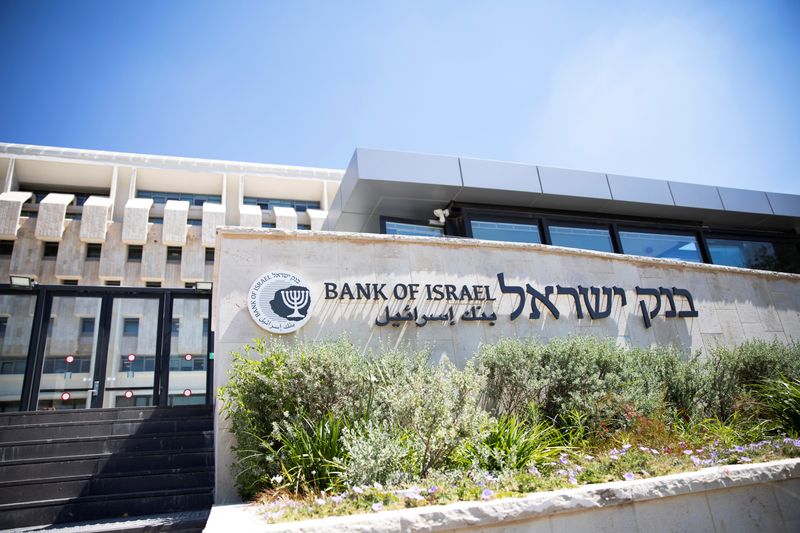By Steven Scheer
JERUSALEM (Reuters) – Bank of Israel policymakers will be watching inflation data and whether the 2025 budget plans to continue a “very expansionary” fiscal policy to help determine if rate hikes are needed to curb rising price pressures, the deputy governor said on Thursday.
With inflation rising rapidly in recent months, the central bank on Wednesday held its benchmark interest rate at 4.5% for a sixth straight meeting after a 25 basis point reduction on Jan. 1. This is in contrast with easing inflation and interest rates in the United States and in Europe.
Israeli inflation accelerated to 3.6% in August from 3.2% in July – mainly as a result of supply disruptions stemming from Israel’s war with Hamas in Gaza – to move farther beyond the government’s annual 1%-3% target range.
“We’ll have until the next interest rate meeting two CPI readings, which we’ll be looking at carefully,” Bank of Israel Deputy Governor Andrew Abir said in an interview with Reuters.
The next rates decision is on Nov. 25.
Abir noted the cabinet on Oct. 31 is slated to vote on the 2025 state budget draft.
“So there’s plenty of important data points coming up, plus how the war is developing,” Abir said. “Monetary policy is restrictive, and the question is whether it’s restrictive enough in order to get the inflation back into the target and to maintain the stability of the market.
“It’s not something that we decided upon, but it’s certainly something that has to be debated,” he added. “The facts have changed since we last spoke about it (after the prior rates decision in late August), and the inflationary environment is much more challenging.”
‘WE WILL BE VERY CAREFUL’
While much of the inflation spike is due to supply disruptions in tourism, construction and agriculture, Abir said demand is holding up and consumer spending has grown during the war, which began Oct. 7, 2023.
He said conducting monetary policy is complicated since it is not just a case of both supply and demand contracting. “But we have supply being constrained at the same time that the demand is pretty strong,” Abir said.
“We clearly don’t want to create a situation where demand collapses, so we will be very careful about what we do, but we still need to balance the supply and demand,” he said.
A lot depends on fiscal policy, which he said was “very expansionary” – and inflationary – due to a sharp rise in state spending to fund the war. He added that a very expansionary fiscal policy had implications for monetary policy.
Despite scant growth of just 0.5% expected in 2024, Abir doubts Israel is headed for stagflation – when growth is slow and inflation high – since unemployment is low and wages are growing well and fuelling demand.

“We don’t want to over-react,” he said. “But on the other hand, we need to see that inflation … is in the process of coming back into the target” which is not expected until the latter part of 2025.
“Whether we need further monetary constraints to achieve that still remains to be seen,” Abir said. “I don’t think any central bank wants to raise interest rates, but in the end, our job is to keep inflation under control, because of the implications of losing control of inflation on sustainable growth over the medium term.”
